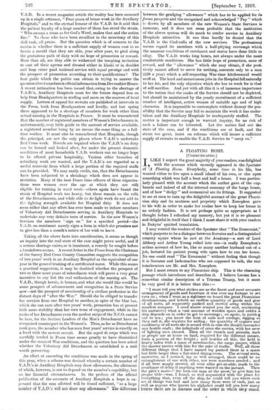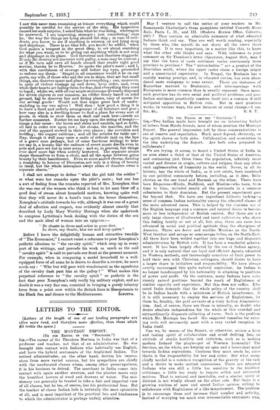I LIKP. I expect the great majority of your readers,
was delighted with the account which recently appeared in the Spectator of 'A Floating Home. Everybody, some time in his life, has wanted either to live upon a small island of his own, or else upon something which was half a boat and half a house. I was particu- larly pleased with the account which the author gave of the cup- boards and indeed of all the internal economy of the barge house, and of how "dodgy " and economical are its fittings. It suggested to me at once to turn up the delightful account of the great Phceni- clan ship and its neatness and propriety which Xenophon gave to his wife in order to make her realise how to keep her house in an orderly fashion. It is not perhaps quite as appropriate as I thought before I refreshed my memory, but yet it is so pleasant and delightful in itself that I think I must share it with your readers in Dakyme spirited translation.
I may remind the readers of the Spectator that " The Economist," which purports to be a dialogue between Socrates and a distinguished
country squire whom he met at the Academy—a sort of Lord Althorp and Arthur Young rolled into one—is really Xenophon's artless account of how he, like so many another husband out of a job, lectured his patient young wife upon how to run her house.. No one could read " The Economist " without feeling that though it is Socrates and Ischomachus who are supposed to talk, the real interlocutors are Mr. and Mrs. Xenophon.
But I must return to my Phoenician ship. This is the charming passage which introduces and describes it. I believe Lucian has a somewhat similar description of a Trireme Tramp, but it must be very good if it is better than this :—
" I must tell you what strikes me as the finest and most accurate arrangement of goods and furniture it was ever my fortune to set eyes on ; when I went as a sightseer on board the great Phoenician merchantman, and beheld an endless quantity of goods and gear of all sorts, all separately packed and stowed away within the [smallest compass. I need scarce remind you (he said, continuing his narrative) what a vast amount of wooden spars and cables a ship depends on in order to get to moorings ; or, again, in putting out to sea ; you know the host of sails and cordage, rigging an they call it, she requires for sailing ; the quantity of engines and machinery of all sorts she is armed with in case she should encounter any hostile craft ; the infinitude of arms she carries, with her crew of fighting men aboard. Then all the vessels and utensils, such as people use at home on land, required for the different messes, form a portion of the freight ; and besides all this, the hold is heavy laden with a mass of merchandise, the cargo proper, which the master carries with him for the sake of traffic. Well, all these different things that I have named lay packed there in a space but little larger than a fair-sized dining-room. The several sorts, moreover, as I noticed, lay so well arranged, there could be no entanglement of one with other, nor were searchers needed ; and if all were snugly stowed, all were alike get-at-able, much to the avoidance of delay if anything were wanted on the instant. Then the pilot's mate—' the look-out man at the prow,' to give him his proper title—was, I found, so well acquainted with the place for everything that, even off the ship, he could tell you where each set of things was laid and how many there were of each, just as well as anyone who knows his alphabet could tell you how many letters there are in Socrates and the order in which they stand. I saw this same man examining at leisure eve wing which could possibly be needful for the service of the ship. Y is inspection caused me such surprise, I asked him what he was doing, whereupon he answered, ` I am inspecting, stranger • just considering,' says he, ` the way the things are lying aboard ;he ship ; in case Of acci- dents, you know, to see if anything is missing, or not lying snug and shipshape. There is no time left, you know,' he added, when God makes a tempest in the great dMp, to set about searching for what you want, or to be giving out anything which is not snug and shipshape in its place. God threatens and chastises sluggards. If only He destroy not innocent with guilty, a man may be content ; or if He turn and save all hands aboard that render right good service, thanks be to Heaven.' So spoke the pilot's mate ; and I, with this carefulness of stowage still before my eyes, proceeded to enforce my thesis ` Stupid in all oonsoience would it be on our parts, my wife, if those who sell the sea in ships, that are but small things, can discover space and place for everything ; can, moreover, in spite of violent tossings up and down, keep order, and, even while their hearts are failing them for fear ,find everything they need to hand; whilst we, with all our ample storerooms diversely disposed for divers objects in our mansion, an edifice firmly based on solid ground, fail to discover fair and fitting places, easy of access for our severed goods ! Would not that argue great leek of under- standing in our two selves ? Well then ! how good a thing it is to have a fixed and orderly arrangement of all furniture and gear ; how easy also in a dwelling-house to find a place for every sort of goods, in which to stow them as shall suit each best—needs no further comment, Rather let me harp upon the string of beauty— image a fair scene : the boots and shoes and sandals, and so forth, all laid in order row upon row ; the cloaks, the mantles, and the rest of the apparel stowed in their own places ; the coverlets and bedding ; the copper caldrons ; and all the articles fqr table use Nay, though it well may raise a smile of ridicule (not on the lips of a grave man perhaps, but of some facetious witting) to hear me say it, a beauty like the oadenoe of sweet music dwells even in pots and pans set Out in neat array : and so, in general, fair things ever show more fair when orderly bestowed. The separate atoms shape themselves to form a choir, and all the space between gains beauty by their banishment. Even so some sacred chorus, dancing a roundelay in honour of Dionysius, not only is a thing of beauty in itself, but the whole interspace swept clean of dancers owns a separate charm: " I shall not attempt to define " what the girl told the soldier " or what were her remarks upon the pilot's mate ; but one has a sort of feeling from the remarks reported of Mrs. Xenophon that she was one of the women who think it best to let men blow a a good deal of steam about household matters, knowing quite well that they will never do a hand's turn in the house themselves. Xenophon's attitude towards his wife, although it was one of a great deal of affection and respect, was evidently almost exactly that described by Lady Mary Wortley Montagu when she undertook to compress Lyttelton's book dealing with the duties of the sex and the male ideal of woman into an epigram:—
" Be chaste in dress and isobar in your diet. In short, my dearie, kiss me and keep quiet."
Before I leave the delightfully human and attractive twaddle of " The Economist," I cannot resist a reference to poor Xenophon's pathetic allusions to " the cavalry spirit," which crop up in every part of his writings, and pervade his work as much as the said " cavalry spirit " is said to pervade our front at the present moment. For example, when in comparing a model household to a well- equipped force of all arms he is drawn to describe a review, he must needs say : " Who but will gaze with wonderment as the squadrons of the cavalry dash past him at the gallop ? " What makes this perpetual reference to " the cavalry spirit " so pathetic is the fact that poor Xenophon's only really big military exploit, and no doubt it was a very fine one, consisted in bringing a purely infantry force from a point now within the British lines in Mesopotamia to the Black Sea and thence to the Mediterranean. IeNoTes.



























 Previous page
Previous page